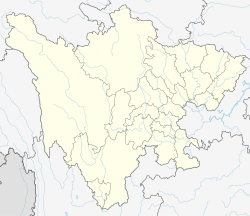Kardze[2][3][a] or Garzê (Tibetan: དཀར་མཛེས, Wylie: dkar mdzes, THL: kar dzé), called Ganzi in Chinese (Chinese: 甘孜; pinyin: Gānzī),[2] is a town and county seat in Kardze County, Kardze Tibetan Autonomous Prefecture in western Sichuan Province, China. Despite Kardze Prefecture being named after the town, the prefecture capital is Kangding, 365 km to the southeast. As of 2010, Kardze was home to 16,920 inhabitants. Kardze is an ethnic Tibetan township and is located in the historical Tibetan region of Kham. It contains the 15th century Kandze Monastery, home to over 500 Gelugpa monks.[9]
Kardze | |
|---|---|
Township | |
| Chinese transcription(s) | |
| • Chinese characters | 甘孜 |
| • Pinyin | Gānzī |
| Tibetan transcription(s) | |
| • Tibetan | དཀར་མཛེས་ |
| • Wylie transliteration | dkar mdzes |
 View of Kardze from the north | |
| Coordinates: 31°37′38″N 99°59′19″E / 31.6273°N 99.9887°E | |
| Country | China |
| Province | Sichuan |
| Prefecture | Kardze Tibetan Autonomous Prefecture |
| County | Kardze County |
| Population (2010)[1] | 16,920 |
| Time zone | UTC+8 (CST) |
Geography
editKardze lies in the large Kardze valley at 3390 metres above sea level and is surrounded by rocky terrain and mountains.[10] The Yalong River's tributary Rongcha River passes through the town from north to south.
Gallery
editNotes
editReferences
editCitations
edit- ^ "Gānzī Zhèn (Gānzī Xiàn)". citypopulation.de. Retrieved 22 March 2017.
- ^ a b Tibet 2002: A Year Book. London: Tibet Information Network. 2003. p. 146–147. ISBN 0-9541961-5-5 – via archive.org.
- ^
- East Asia: Seventh Report of Session 2005-06, Volume 2. Great Britain, Parliament / The Stationery Office. 2006. p. 171. ISBN 9780215030504.
- Annual Report on International Religious Freedom 2007, February 2008, 110-2 Report. United States. Congress. 2008. p. 157.
- Hannah Beech/TAWU (14 November 2011). "Burning desire for freedom". TIME. pp. 47–51 – via archive.org.
- ^ Dorje, Footprint Tibet (1999), p. 496.
- ^ Garri, Irina (2020), "The rise of the Five Hor States of Northern Kham. Religion and politics in the Sino-Tibetan borderlands", Études mongoles et sibériennes, centrasiatiques et tibétaines (51): 7–8
- ^ Kolas, Ashild; Thowsen, Monika P. (2011). On the Margins of Tibet: Cultural Survival on the Sino-Tibetan Frontier. University of Washington Press. pp. 33–34. ISBN 978-0-295-80410-1.
- ^ Smith, Warren (1996). Tibetan Nation: A History Of Tibetan Nationalism And Sino-Tibetan Relations. Avalon Publishing. pp. 377–378. ISBN 978-0-8133-3155-3.
- ^ Ryavec, Karl E. (2015). A Historical Atlas of Tibet. University of Chicago Press. pp. 13, 21. ISBN 978-0-226-24394-8.
- ^ Lonely Planet, Tibet (2005), p. 254; Lonely Planet, Tibet (2011), p. 225
- ^ "Ganzi". Chinadiscover.net. Retrieved December 11, 2009.
Sources
edit- Dorje, Gyurme (1999). Footprint Tibet Handbook with Bhutan (2nd ed.). Bath: Footprint Handbooks. ISBN 0-8442-2190-2, ISBN 1-900949-33-4 – via archive.org.
- Forbes, Andrew ; Henley, David (2011). China's Ancient Tea Horse Road. Chiang Mai: Cognoscenti Books. ASIN: B005DQV7Q2
- Leffman, David, et al. (2005). The Rough Guide to China. 4th Edition. Rough Guides, New York, London, Delhi. ISBN 978-1-84353-479-2.
- Mayhew, Bradley; Kohn, Michael (2011). Tibet. Lonely Planet. ISBN 1-74059-523-8.
- Mayhew, Bradley; Kohn, Michael; Mccrohan, Daniel; Bellezza, John Vincent (2011). Tibet. Lonely Planet – via archive.org.
External links
edit- Hudong Encyclopedia (in Chinese)
